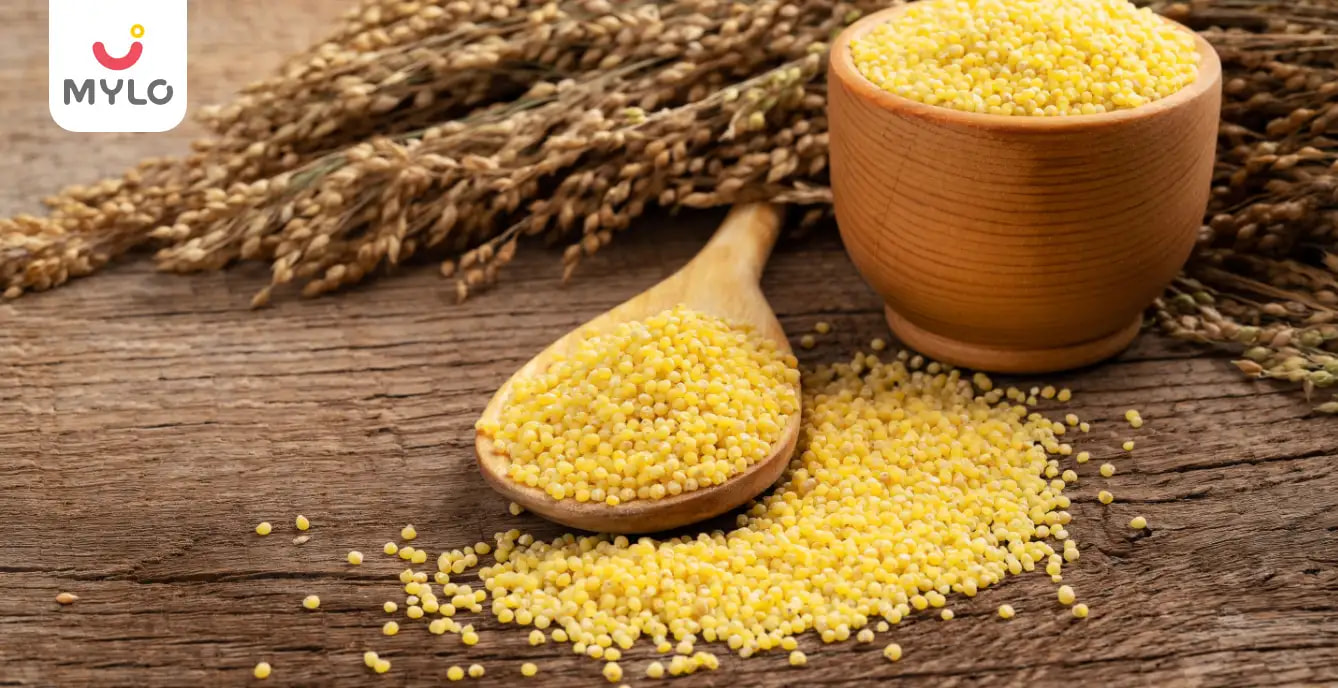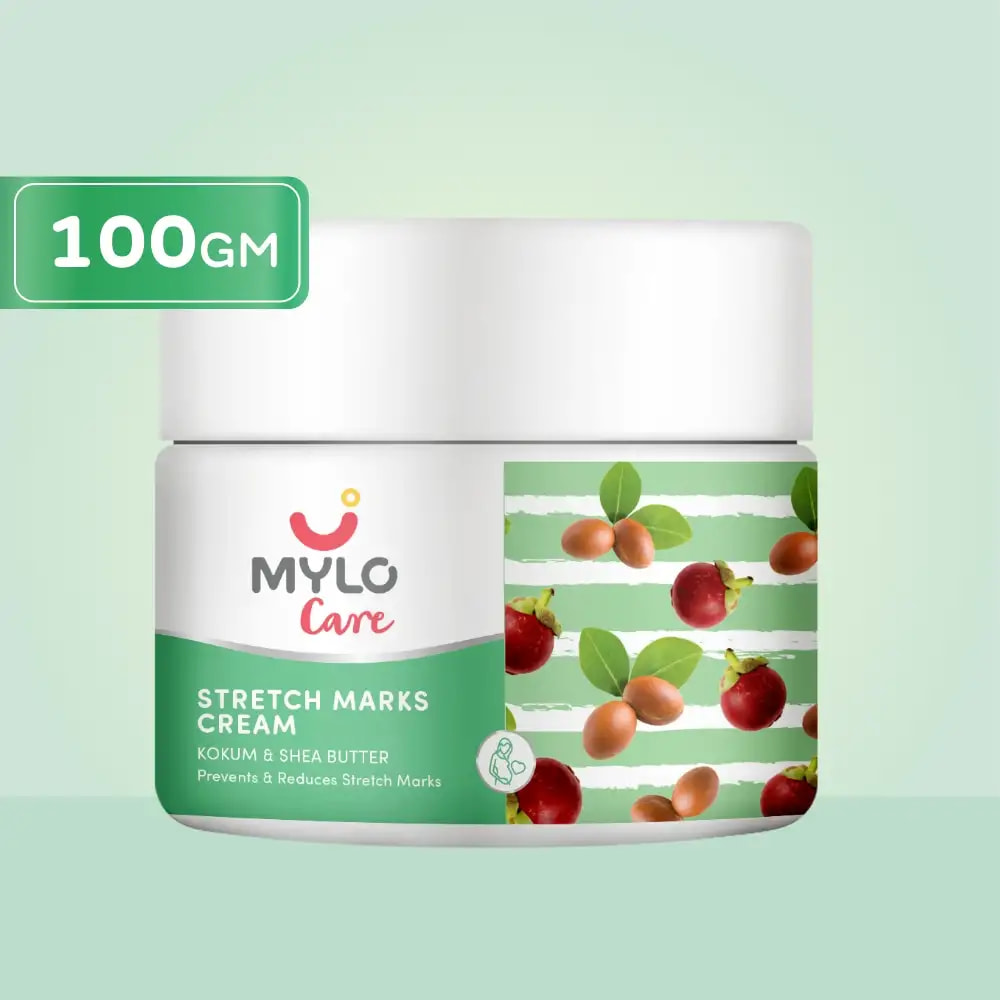Home

Benefits of Millet During Pregnancy
In this Article

Benefits of Millet During Pregnancy
Updated on 3 November 2023
During pregnancy, a woman's diet needs to be balanced and nutritious. It is important to include millet in the diet of an expecting mother. High in essential nutrients and minerals such as calcium, magnesium, potassium, vitamin B6 and other vitamins, millet during pregnancy is quite popular among health-conscious mothers. They have a low glycemic index which makes them suitable even for people with diabetes. This blog post will explore the benefits of millet during pregnancy and how it can be naturally included in daily meals.
What is Millet?
Millet is a small, round grain that is popular in many African and Asian countries. It is a good source of vitamins and minerals and is high in fiber. Millet is also low in fat and calories, making it a healthy choice for pregnant women.
Pregnant women are often advised to maintain a good source of folic acid. Folic acid helps prevent birth defects of the brain and spine. Iron is also for pregnant women because it helps to prevent anemia which can make pregnancy more difficult and can lead to problems during delivery.
Rich in both folic acid and iron, Millet is easy to cook and can be added to soups, stews, or casseroles. It can also be eaten as a porridge or pilaf. Millet is a versatile grain that can be enjoyed as part of a healthy pregnancy diet.
Nutritional Value of Millet
Millets during pregnancy are a powerhouse of nutrients and offer a host of health benefits. They are rich in fiber, vitamins, minerals, and antioxidants.
Here is a look at the nutritional value of millets and their potential health benefits during pregnancy:
1. Fiber
Millets are a good source of dietary fiber. This helps to promote regularity and prevents constipation. It is also important for regulating blood sugar levels.
2. Vitamins
Millets are rich in essential vitamins like thiamine, riboflavin, niacin, and folic acid. These vitamins play an important role in pregnant women, including supporting energy production and cell growth.
3. Minerals
Millets contain high levels of minerals like iron, magnesium, phosphorus, and potassium. These minerals are involved in various processes in the body including blood formation, energy production, and muscle contraction.
4. Antioxidants
Millets contain antioxidants that help to protect cells from damage caused by free radicals. This is particularly important during pregnancy when the body is under increased stress.
Overall, millets are a great source of nutrients for pregnant women. They provide important vitamins and minerals that are essential for the healthy development of the fetus. They also contain fiber and antioxidants which can support overall health.
You may also like: What Is The Best Thing For Pregnant Women To Eat?
Millets and Pregnancy
Pregnancy is a crucial time for the mother and child, where food plays an important role in the development of both. Millets are a group of highly nutritious, gluten-free grains that can offer many benefits during pregnancy. They are rich in vitamins, minerals, and antioxidants, which can help support the health of both the mother and child. Additionally, millets are a good source of fiber, which can help to prevent constipation and other digestive issues common during pregnancy.
Eating millet during pregnancy can help to ensure that you and your baby are getting the nutrients you need for a healthy pregnancy. You could talk to your healthcare provider about incorporating millet into your diet during pregnancy.
Also read: Healthy Pregnancy Food
Pearl millet during pregnancy
Eating pearl millet during pregnancy has several benefits.Pearl millet, one of the most widely grown types of millet, is a good source of folic acid, which is important for the development of the neural tube. It is also a good source of iron, which is important for the production of hemoglobin.
Pearl millet during pregnancy is also a good source of magnesium, which is important for the relaxation of muscles.
Millet benefits for pregnant women's health
Millet is a highly nutritious grain that has numerous benefits for pregnant women. It is a good source of folic acid, which is essential for the development of the neural tube. Millet also contains high levels of magnesium, which is important for proper muscle and nerve function. Additionally, millet is a good source of iron and B vitamins, which are important for energy production and red blood cell formation.
Side Effects of Millet During Pregnancy
There are no known side effects of millet during pregnancy. This nutritious grain is a good source of essential nutrients, including iron and vitamin B6. Millet is also high in fiber and low in calories, making it a healthy choice for pregnant women. However, as with all food groups, it is important to eat millet in moderation and to consult with healthcare providers before adding it to one's diet.
Also read: The Daily Balanced Diet of a Pregnant Woman: What to Eat and Avoid
Conclusion
To conclude, millet during pregnancy is an extremely nutritious whole grain that can be a great addition to the diet of pregnant women. Its high fiber content and abundance of nutrients make it an excellent choice for promoting digestive health, supporting fetal development, and helping to prevent certain pregnancy-related complications. So, if you are looking for more information on healthy and nourishing snacks during your pregnancy journey, Visit Mylo Family for more such educational blogs.
References
1. Huybregts, L. F., Roberfroid, D. A., Kolsteren, P. W., & Van Camp, J. H. (2009). Dietary behaviour, food and nutrient intake of pregnant women in a rural community in Burkina Faso. Maternal & Child Nutrition
2. Nguyen, P. H., Kachwaha, S., Tran, L. M., Sanghvi, T., Ghosh, S., Kulkarni, B., Beesabathuni, K., Menon, P., & Sethi, V. (2021). Maternal Diets in India: Gaps, Barriers, and Opportunities. Nutrient
Tags
Benefits of Millet During Pregnancy in Hindi, Benefits of Millet During Pregnancy in Bengali, Benefits of Millet During Pregnancy in Telugu, Benefits of Millet During Pregnancy in Tamil

Stretch Marks Cream - 100 gm
Removes Stretch Marks | Made Safe Australia Certified | Safe During Pregnancy & Breastfeeding
₹ 337

4.2
(15435)


115354 Users bought



Written by
Priyanka Verma
Priyanka is an experienced editor & content writer with great attention to detail. Mother to an 11-year-old, she's a ski
Read MoreGet baby's diet chart, and growth tips

Related Articles
Related Questions
Hello frnds..still no pain...doctor said head fix nhi hua hai..bt vagina me pain hai aur back pain bhi... anyone having same issues??

Kon kon c chije aisi hai jo pregnancy mei gas acidity jalan karti hain... Koi btayega plz bcz mujhe aksar khane ke baad hi samagh aata hai ki is chij se gas acidity jalan ho gyi hai. Please share your knowledge

I am 13 week pregnancy. Anyone having Storione-xt tablet. It better to have morning or night ???

Hlo to be moms....i hv a query...in my 9.5 wk i feel body joint pain like in ankle, knee, wrist, shoulder, toes....pain intensity is high...i cnt sleep....what should i do pls help....cn i cosult my doc.

Influenza and boostrix injection kisiko laga hai kya 8 month pregnancy me and q lagta hai ye plz reply me

RECENTLY PUBLISHED ARTICLES
our most recent articles

Diet & Nutrition
গর্ভাবস্থায় আলুবোখরা: উপকারিতা ও ঝুঁকি | Prunes During Pregnancy: Benefits & Risks in Bengali

Diet & Nutrition
গর্ভাবস্থায় হিং | ঝুঁকি, সুবিধা এবং অন্যান্য চিকিৎসা | Hing During Pregnancy | Risks, Benefits & Other Treatments in Bengali

Women Specific Issues
স্তনের উপর সাদা দাগ: লক্ষণ, কারণ এবং চিকিৎসা | White Spots on Nipple: Causes, Symptoms, and Treatments in Bengali

Diet & Nutrition
গর্ভাবস্থায় পোহা: উপকারিতা, ধরণ এবং রেসিপি | Poha During Pregnancy: Benefits, Types & Recipes in Bengali

Diet & Nutrition
গর্ভাবস্থায় মাছ: উপকারিতা এবং ঝুঁকি | Fish In Pregnancy: Benefits and Risks in Bengali

Diet & Nutrition
গর্ভাবস্থায় রেড ওয়াইন: পার্শ্ব প্রতিক্রিয়া এবং নির্দেশিকা | Red Wine During Pregnancy: Side Effects & Guidelines in Bengali
- ইনার থাই চ্যাফিং: কারণ, উপসর্গ এবং চিকিৎসা | Inner Thigh Chafing: Causes, Symptoms & Treatment in Bengali
- গর্ভাবস্থায় ব্রাউন রাইস: উপকারিতা ও সতর্কতা | Brown Rice During Pregnancy: Benefits & Precautions in Bengali
- Velamentous Cord Insertion - Precautions, Results & Safety
- Unlock the Secret to Flawless Skin: 7 Must-Have Qualities in a Face Serum
- Unlock the Secret to Radiant Skin: How Vitamin C Serum Can Transform Your Complexion
- Gender No Bar: 10 Reasons Why Everyone Needs a Body Lotion
- Unlock the Secret to Radiant Skin How to Choose the Perfect Body Lotion for Your Skin Type
- Top 10 Reasons to Apply a Body Lotion After Every Bath
- Communication in Toddlers: Milestones & Activities
- How to Improve Vocabulary for Toddlers?
- A Comprehensive Guide to Understanding Placenta Accreta
- Vulvovaginitis in Toddlers Causes, Symptoms and Treatment
- A Comprehensive Guide to Understanding Cerebral Palsy in Children
- Bitter Taste in Mouth During Pregnancy: Understanding the Causes and Remedies


AWARDS AND RECOGNITION

Mylo wins Forbes D2C Disruptor award

Mylo wins The Economic Times Promising Brands 2022
AS SEEN IN

- Mylo Care: Effective and science-backed personal care and wellness solutions for a joyful you.
- Mylo Baby: Science-backed, gentle and effective personal care & hygiene range for your little one.
- Mylo Community: Trusted and empathetic community of 10mn+ parents and experts.
Product Categories
baby carrier | baby soap | baby wipes | stretch marks cream | baby cream | baby shampoo | baby massage oil | baby hair oil | stretch marks oil | baby body wash | baby powder | baby lotion | diaper rash cream | newborn diapers | teether | baby kajal | baby diapers | cloth diapers | laundry detergent 6472 | lactomama lactation granules |




